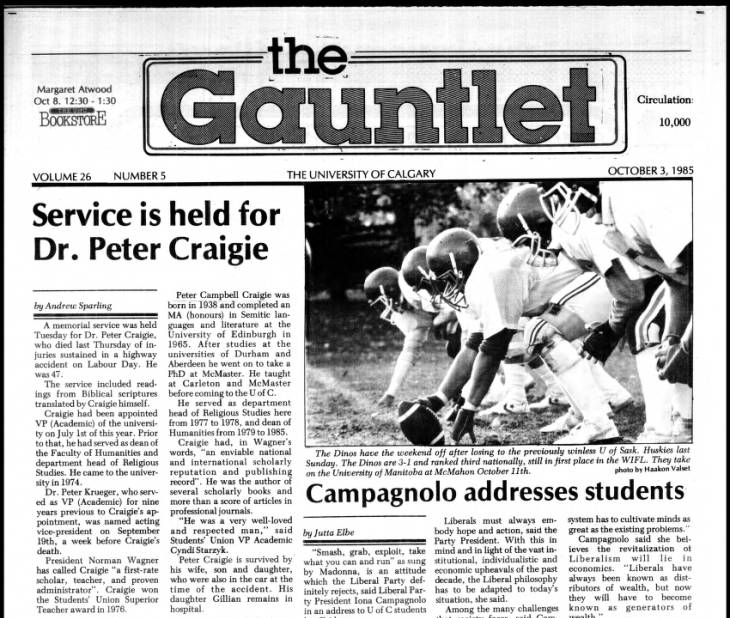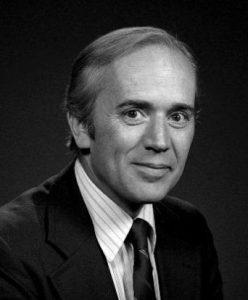
This Week in Gauntlet History, September 29th to October 5th
By Nikayla Goddard, September 30 2019 —
Within the pages of the Gauntlet, history has shown itself to be a pattern. Recurring issues surrounding politics, economy, equal rights, and more cycle through each year – some things have changed, but a lot also hasn’t. ‘This Week in Gauntlet History’ recounts a handful of published stories from the past that are either interesting or relevant to today’s events. Stretching from our first issue in September of 1960 through to the turn of the 21st century, the Gauntlet is packed full of historical events and wild campus tales.
Buckle your seatbelt – we’re starting off strong this week with Prime Minister Pierre Trudeau’s visit to Calgary in 1972, when birth control became available on campus, when the University of Calgary adopted the ABC 4.0 grading system, in memoriam Dr. Peter Craigie and that time we published a full-page feature on LSD next to a full-page feature on how to have a seance.
September 29, 1972: “Low-key Trudeau lights no fires in city.”
Pierre Trudeau’s second campaign running for Prime Minister – one which saw him elected that year – brought him on a tour to Calgary. While police and Trudeau’s bodyguards amped up security, expecting incidents or at least a riot or two, the visit itself was very lacklustre.
“Not a single picket greeted Trudeau at his Stampede Corral rally Tuesday night,” the Gauntlet article reads. “The local party cadres had obviously arrived prepared for a high powered election rally but the relatively small turnout and Trudeau’s low keyed approach certainly dampened the expectations of the Westerners…. As Trudeau stood insignificantly on the stage speaking to a sparsely populated Corral it seemed he does not feel particularly confident of electoral success in this province.”
October 1st, 1969: “Birth control assistance becomes available.”
Making the front page, the article recounts how Ruth Watson, U of C’s dean of women, and Dr. Ian Shand, the new director of student health services, “recognized the problem that students engaging in pre-marital sex are faced with the conflict between their will to accept the ‘moral responsibility’ for their actions and society’s opposing attitude that young people are incapable of formulating an acceptable moral philosophy.”
Watson continued by saying that if couples are going to have pre-marital sex anyways, “I think it’s really important that they have some means of protection available to them.”
The “assistance” that became available was not the ability to get prescriptions through the university health services. Students could, however, be given an “understanding and sympathetic ear” and information on options. Dr. A. O’Neil, female director of the Calgary Association for Responsible Planned Parenthood, along with Watson and Shand, was not satisfied with the university’s stance. The recently opened Planned Parenthood in Calgary was aimed towards married couples, but they were pushing to have it expand to unmarried couples.
The article reads: “Referring to the expanding of the services,” Dr. O’Neil said, “It’s something that’s just got to be done.” The article continues, and “at the risk of jeopardizing her professional position, she’s about to do it.”
The methods of birth control usage available through Planned Parenthood included “the IUD, pill, diaphragm and jelly, rhythm, condom and foam.”
October 3rd, 1985: “Service is held for Dr. Peter Craigie.”

Another front-page story celebrates the life of the esteemed Dr. Craigie, for which Calgary Hall was renamed Craigie Hall posthumously.
Dr. Craigie passed away on Sept. 27 at the age of 47 due to injuries sustained during a car accident on Labour Day. The memorial took place on Oct. 1, and included readings from Biblical scriptures that he translated himself.
The article reads: “Craigie had been appointed VP (Academic) of the university on July 1st of this year. Prior to that, he had served as dean of the Faculty of Humanities and department head of Religious Studies. He came to the university in 1974. Dr. Peter Krueger, who served as VP (Academic) for nine years previous to Craigie’s appointment, was named acting vice-president on September 19th, a week before Craigie’s death.
“Craigie won the Students’ Union Superior Teacher award in 1976. Peter Campbell Craigie was born in 1938 and completed an MA (honours) in Semitic languages and literature at the University of Edinburgh in 1965. After studies at the universities of Durham and Aberdeen he went on to take a PhD at McMaster. He taught at Carleton and McMaster before coming to the U of C. He served as department head of Religious Studies here from 1977 to 1978, and dean of Humanities from 1979 to 1985…. He was the author of several scholarly books and more than a score of articles in professional journals.”
October 4th, 1967: “New Grade System Is Adopted.”
The University of Calgary adopted the ABCDF 4.0 grading system. Dr. D. B. Black, who bills himself as “your friendly registrar,” believes the new system will eliminate the “illusion of exactness” created by the old percentage system.
“The letters are freely convertible to the widely – used American four-point system. A equals four, B three, C two and D one. F, naturally is zero. Professors are taking the thing calmly, if with a little academic begrudgement.”
October 5th, 1966: “LSD” and “Have a Seance.”
“Although LSD-25 has not yet been banned, the controversy created by its use may well bring about such an injunction” the opening line to the article reads. The article mostly goes over how – while it doesn’t advocate the free use of LSD – it doesn’t want it outlawed either.
“Firstly, by repressing the drug, the effects may be made more harmful if it is used, and such repression of LSD rules out its useful employment under supervision to cure certain forms of mental illness.
“Secondly, a law banning LSD would be unenforceable. The normal dosage is no bigger than a speck of dust, and could be put on the back of a postage stamp to be licked off when needed.
“Thirdly, a ban on LSD would drive it underground, where the association with criminal elements would do more harm than good.”
The article advocates that under supervision of a psychiatrist or qualified doctor, LSD can assist people with mental illnesses through “the difficult and painful process of understanding and accepting himself.” The article then outlines eight different sensations LSD users can feel, from feeling one with the universe to enhancement of sensory fields to being able to experience a wider range of emotions.
The seance article on the opposite page speaks with a group of students who regularly hold seances and acknowledge that they may not necessarily be contacting other spirits, but more under the effects of self-hypnosis.
“The atmosphere for a seance does not require a mysterious or gloomy room. A seance can be held in any room with natural surroundings. The room is usually dark, but there may be a dim light. The participants sit around the table with their palms flat on the table and fingers touching in an unbroken ring. Their feet are flat on the floor and touching the feet of the persons to the right and left. The most important person in any seance is the control. He passes the power from his right arm to the left arm of next participant who passes the power to the person beside him and so forth around the table back to the control.”
The reporter goes over his experience in attending one of these seances, writing how after one hour of ‘passing the power’ one student was possessed by a spirit. The spirit appeared to be referring to someone named Joe and referred to flying planes from Buffalo to Oshawa in 1914.
While the reporter seemed convinced by the events that took place, they added that “No attempt is made here to prove the validity of the seance sessions this group holds. That is left up to the reader.”
‘This Week in Gauntlet History’ is a news feature that will be published every Monday, recounting the history from yesteryear that took place that week.
